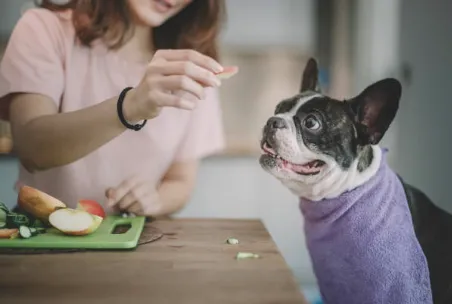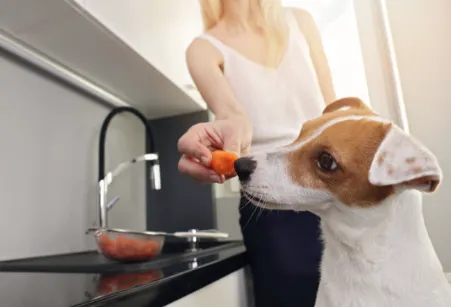As devoted pet parents, we constantly seek ways to enrich our dogs’ lives, and that often includes sharing delicious snacks. While commercial dog treats are plentiful, you might be surprised to learn that many everyday fruits and vegetables from your kitchen can be excellent and healthy additions to your dog’s diet. Knowing What Is A Good Snack For My Dog involves understanding not just what’s tasty, but also what’s safe, nutritious, and beneficial for their overall well-being. This guide from Dog Care Story will help you navigate the world of human foods that make fantastic, healthy dog snacks, offering a fresh alternative to store-bought options.
The Benefits of Healthy Dog Snacks
Beyond just satisfying a craving, incorporating healthy fruits and vegetables as snacks can provide numerous advantages for your canine companion. These natural treats are often lower in calories, fats, and artificial ingredients compared to many processed dog treats, making them ideal for weight management. They can also provide essential vitamins, minerals, and fiber, contributing to better digestion, stronger immunity, and even improved dental health. Plus, offering a variety of textures and flavors can be a great way to provide mental enrichment and keep your dog engaged. For those focused on training, understanding what is the best treat for puppy training can make a significant difference in success and motivation.
Safe & Healthy Fruits for Your Dog
Many fruits are packed with nutrients and make fantastic, refreshing snacks for dogs when prepared correctly and offered in moderation.
Apples
Apples are an excellent choice for a canine snack. They are rich in vitamins A and C, and provide a good source of dietary fiber, which aids digestion. Their low protein and fat content make them particularly suitable for older dogs or those on a special diet. Always remember to remove the core and all seeds, as apple seeds contain cyanide, which is toxic to dogs. Offering apple slices can also help clean your dog’s teeth.
Bananas
Bananas are a great source of potassium, vitamins (including B6 and C), biotin, fiber, and copper. However, they are also high in natural sugars, so moderation is key. Bananas should be considered an occasional special treat rather than a daily dietary staple. A few slices or a small mashed portion can be a delightful and nutritious boost.
Blueberries
Often hailed as a superfood, blueberries are beneficial for both humans and dogs. They are loaded with antioxidants, fiber, and vitamins C and K. These tiny berries are a perfect size for training treats or a quick, healthy snack. You can offer them fresh, frozen, or even mixed into plain, unsweetened yogurt for an extra tasty delight.
Wholesome Vegetables Your Dog Will Love
Just like fruits, many vegetables are safe and beneficial for dogs, providing hydration, vitamins, and minerals without excessive calories.
Cucumbers
Cucumbers are an ideal snack for dogs, especially those needing to manage their weight. Composed of about 95% water, they are incredibly hydrating and contain minimal carbohydrates or fats. They also provide vitamins K, C, and B1, along with potassium, copper, magnesium, and biotin. Sliced cucumbers can be a crunchy, refreshing treat, and freezing them can turn them into a fun, long-lasting enrichment snack during warmer months.
Pumpkin
Pure pumpkin is a fantastic addition to your dog’s diet, especially for those with sensitive stomachs or digestive issues. It’s rich in fiber and antioxidants. If using canned pumpkin, ensure it’s 100% pure pumpkin puree, not pumpkin pie filling, which contains added sugars and spices that can be harmful. Alternatively, you can roast fresh pumpkin, peel it, and offer small pieces.
 A bowl filled with a colorful assortment of dog-safe fruits and vegetables like apple slices, carrot sticks, blueberries, and cucumber pieces, ready as healthy snacks for a dog.
A bowl filled with a colorful assortment of dog-safe fruits and vegetables like apple slices, carrot sticks, blueberries, and cucumber pieces, ready as healthy snacks for a dog.
Carrots
Yes, dogs can definitely eat carrots! These crunchy root vegetables are a low-calorie snack that can help dogs feel fuller for longer, making them excellent for weight management plans. Carrots are high in fiber and beta-carotene (which converts to vitamin A), promoting good vision and immune health. Their firm texture also makes them a great natural dental chew, helping to scrape away plaque and keep teeth clean.
 A small Jack Russell dog sniffs a carrot piece offered by a person, illustrating a healthy snack for dogs. Chopped carrots are visible on the kitchen counter, emphasizing dog-safe vegetable treats.
A small Jack Russell dog sniffs a carrot piece offered by a person, illustrating a healthy snack for dogs. Chopped carrots are visible on the kitchen counter, emphasizing dog-safe vegetable treats.
Important Considerations When Offering Human Snacks
While many human foods are safe, it’s crucial to follow some guidelines to ensure your dog’s safety and health:
- Moderation is Key: Treats, even healthy ones, should not make up more than 10% of your dog’s daily caloric intake. Overfeeding can lead to weight gain or an imbalanced diet.
- Proper Preparation: Always wash fruits and vegetables thoroughly. Remove any seeds, pits, stems, or tough skins that could be choking hazards or contain toxic compounds. Cut larger items into bite-sized pieces appropriate for your dog’s size.
- Introduce Slowly: When introducing a new food, start with a very small amount and monitor your dog for any signs of digestive upset or allergic reaction.
- Avoid Seasonings: Never give your dog fruits or vegetables that have been cooked with butter, oil, salt, spices, or other seasonings, as these can be harmful.
Foods That Are NOT Safe for Dogs
Equally important as knowing what is a good snack for my dog is knowing what to absolutely avoid. Many common human foods are highly toxic to dogs and can cause severe illness or even be fatal.
Some of the most dangerous foods for dogs include:
- Grapes and Raisins: Can cause kidney failure.
- Onions, Garlic, Leeks, Chives: Can cause red blood cell damage.
- Chocolate: Contains theobromine, which is toxic to dogs.
- Avocado: Contains persin, which can be toxic in large amounts, especially in the pit and skin.
- Xylitol: An artificial sweetener found in many sugar-free products (gum, candies, peanut butter) that can cause a rapid drop in blood sugar and liver failure.
- Alcohol: Highly toxic and can cause intoxication, vomiting, and diarrhea.
- Macadamia Nuts: Can cause weakness, vomiting, tremors, and hyperthermia.
- Cooked Bones: Can splinter and cause internal damage or choking.
Always double-check if a human food is safe for your dog before offering it. When in doubt, it’s best to err on the side of caution and stick to known safe options.
Conclusion
Providing your dog with healthy and safe snacks from your kitchen can be a wonderful way to boost their nutrition, manage their weight, and enhance your bond. By understanding what is a good snack for my dog and, more importantly, what to avoid, you can confidently offer a variety of delicious fruits and vegetables. Always prioritize your dog’s health and safety by preparing snacks correctly and feeding them in moderation. For any concerns about your dog’s diet or specific health conditions, it is always best to consult with your veterinarian. Explore more resources on dog nutrition and care on Dog Care Story to keep your furry friend happy and healthy!
Disclaimer: This content is for informational and educational purposes only and is not intended as medical advice. Always consult a licensed veterinarian for any health concerns or before making changes to your pet’s diet.
